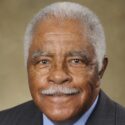A new report from the Center for the Study of Race and Equity in Education at the Graduate School of Education at the University of Pennsylvania provides case study data of Black men who have succeeded in higher education in an effort to show a pathway for others.
 Shaun R. Harper, director of the Center for the Study of Race and Equity in Education conducted interviews with 219 Black male students at 42 colleges and universities in 20 states. Some of the institutions were highly selective. Others were not. Black men at both predominantly Black and predominantly White institutions were included.
Shaun R. Harper, director of the Center for the Study of Race and Equity in Education conducted interviews with 219 Black male students at 42 colleges and universities in 20 states. Some of the institutions were highly selective. Others were not. Black men at both predominantly Black and predominantly White institutions were included.
Some common experiences shared by the successful Black men were a strong family commitment to higher education and a teacher who had mentored them during their K-12 years.
“The most surprising finding was also the most disappointing finding,” according to Professor Harper. “Nearly every student we interviewed said it was the first time that someone had sat him down and asked how he had successfully navigated his way to and through higher education, what compelled him to be engaged and what he learned that could help improve achievement and engagement among Black male collegians.”
Dr. Harper is a graduate of Albany State University in Georgia. He earned a doctorate in higher education from Indiana University.
The report, entitled Black Male Student Success in Higher Education: A Report from the National Black Male College Achievement Study, can be downloaded here.












I congratulate Dr. Harper for his ground-breaking research.
Last month, I interviewed a young man who graduated from university. I, too wanted to know what were the ‘causal’ variables that were responsible for his success. The interview was a real eye opener for me and yielded ‘rich’ information about this young man’s ‘success path’coming from a single parent home.
Hello Dr. Shaun R. Harper,
Thanks for this contribution to the field of research.
I will download your report to see what I can learn and how the data would profile me if I were a student navigating my way through higher education.
maybe this report should be mass-mailed to every black student who took the SAT/PSAT this year.
Excellent Study. This needs to be in the hands of high school guidance counselors across the country.
My dissertation was similar, on a much smaller scale. It highlighted the lack of black male role models and how cultural education affected career choices after high school.
It seems that high achievers need a highly developed support system. A common failure is to transition the high school support system to a college support system. Two I can cite are athletics and fraternities.